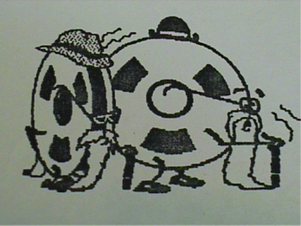BASICS
THE DECAY OF ARCHIVED TAPE MASTERS, COMBINED WITH ACCELERATING OBSOLECENCE, IS AN IMMEDIATE CONCERN.
Everything you have recorded on audio and video tape is at risk….and that risk is increasing exponentially with every passing year. To access and/or transfer recordings you need three things:
1) Specially designed “format specific” machinery.
2) Tapes in sufficiently good condition to facilitate playback on the machinery.
3) People who know how to use and maintain the machinery.
At a frightening speed, playback machines are becoming obsolete and unavailable, tapes are decaying to an unusable condition and the technicians and engineers with the required level of expertise are retiring from the industry. There is still a window of opportunity to access recordings from most magnetic tape formats, but that window is closing fast.
PRESERVATION STEPS AND BACKGROUND INFORMATION.
To preserve the recordings on your legacy tapes you first need to know what you have and be able to describe it to others. For this, BASIC MATERIAL IDENTIFICATION is important. You also need to know the condition of your materials to determine if they are safe to play or may be at risk. For general condition assessment, there are BASIC INSPECTION TECHNIQUES mandated by International Standards. If you are dealing with ¾” U-matic or Beta cassettes, review COMMON SIGNS OF PROBLEM VIDEOCASSETTES.
To get a better understanding of what can go wrong with your tapes and what renders them unsafe to play, consider: TAPE ENDANGERMENT ISSUES; EFFECTS OF MOISTURE ON MAGNETIC TAPES; EFFECTS OF TEMPERATURE ON MAGNETIC TAPES. A tutorial on the importance of debris removal to facilitate optimal signal retrieval can be found in THE BENEFITS OF TAPE CLEANING.
To see what can happen if these problems aren’t addressed, consider the DANGERS OF INADEQUATE RESTORATION DURING DIGITIZATION.
It is also truly important to consider just how dangerous obsolescence is to preserving your material. Each tape type you have needs different, specific machinery to play and reviewing a TIMELINE OF LEGACY TAPE DEVELOPMENT gives an overview of just how many different types of tapes have been made. Obsolescence is a crisis issue and can render your recordings unrecoverable. Following the TIMELINE OF OBSOLESCENCE will show how quickly this crisis of machine obsolescence is advancing past critical to terminal. The technology to preserve the recordings on your tapes is disappearing.
Leaving recordings on legacy tapes will soon not be enough to preserve them. Eventually, you will have to consider ARCHIVE TRANSFER of your tape content before the playback technology is unavailable. As most experts agree that there is already insufficient machinery left to play back all of the recorded audio and video tape in the United States, if you wish to preserve your recordings, you need to act on restoring and digitizing them as soon as possible. SPECS BROS. can help you with identifying your materials, examining them for decay and damage problems, restoring them to optimal condition for playback, consulting on restoration and digitization options and digitizing your materials for preservation into the future. CONTACT US and we will help in any way we can, from consulting on preservation to training your staff to handling your entire preservation project from initial examination to digitization at our facility.
1) Specially designed “format specific” machinery.
2) Tapes in sufficiently good condition to facilitate playback on the machinery.
3) People who know how to use and maintain the machinery.
At a frightening speed, playback machines are becoming obsolete and unavailable, tapes are decaying to an unusable condition and the technicians and engineers with the required level of expertise are retiring from the industry. There is still a window of opportunity to access recordings from most magnetic tape formats, but that window is closing fast.
PRESERVATION STEPS AND BACKGROUND INFORMATION.
To preserve the recordings on your legacy tapes you first need to know what you have and be able to describe it to others. For this, BASIC MATERIAL IDENTIFICATION is important. You also need to know the condition of your materials to determine if they are safe to play or may be at risk. For general condition assessment, there are BASIC INSPECTION TECHNIQUES mandated by International Standards. If you are dealing with ¾” U-matic or Beta cassettes, review COMMON SIGNS OF PROBLEM VIDEOCASSETTES.
To get a better understanding of what can go wrong with your tapes and what renders them unsafe to play, consider: TAPE ENDANGERMENT ISSUES; EFFECTS OF MOISTURE ON MAGNETIC TAPES; EFFECTS OF TEMPERATURE ON MAGNETIC TAPES. A tutorial on the importance of debris removal to facilitate optimal signal retrieval can be found in THE BENEFITS OF TAPE CLEANING.
To see what can happen if these problems aren’t addressed, consider the DANGERS OF INADEQUATE RESTORATION DURING DIGITIZATION.
It is also truly important to consider just how dangerous obsolescence is to preserving your material. Each tape type you have needs different, specific machinery to play and reviewing a TIMELINE OF LEGACY TAPE DEVELOPMENT gives an overview of just how many different types of tapes have been made. Obsolescence is a crisis issue and can render your recordings unrecoverable. Following the TIMELINE OF OBSOLESCENCE will show how quickly this crisis of machine obsolescence is advancing past critical to terminal. The technology to preserve the recordings on your tapes is disappearing.
Leaving recordings on legacy tapes will soon not be enough to preserve them. Eventually, you will have to consider ARCHIVE TRANSFER of your tape content before the playback technology is unavailable. As most experts agree that there is already insufficient machinery left to play back all of the recorded audio and video tape in the United States, if you wish to preserve your recordings, you need to act on restoring and digitizing them as soon as possible. SPECS BROS. can help you with identifying your materials, examining them for decay and damage problems, restoring them to optimal condition for playback, consulting on restoration and digitization options and digitizing your materials for preservation into the future. CONTACT US and we will help in any way we can, from consulting on preservation to training your staff to handling your entire preservation project from initial examination to digitization at our facility.

